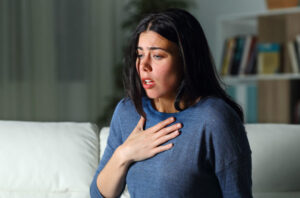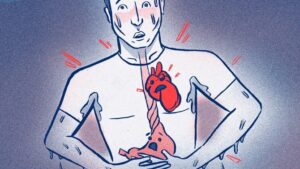How to recognize a panic attack?
Irrational fear of something, incomprehensible to other people. Many call it irrational, involuntary and inappropriate reactions to fear, which generally lead to avoidance of usual places, objects or situations. Symptoms include: tension attacks, panic, dizziness, throat constriction, inability to swallow, muscle twitching, sweating, depression, nausea, obsession, and feeling as if the person is out of their body. The heart starts to beat faster, the person feels nauseous and trembles, as if he is going to faint.
What are the causes?
There are three types of phobias: simple phobias, social phobias and agoraphobia. In the case of a simple phobia, a person is afraid of a certain situation, place or object. In the case of social phobia, the person does not like to be where there are many people, such as when there is a celebration. They are afraid to do anything, because they think they would embarrass themselves in front of everyone. Agoraphobics fear being alone, in public places or in an unknown place. It is the fear of not being close to a place or person they trust. And it's the most common type of phobia that people seek professional help for. It occurs most often in women aged 15 to 45. Panic attacks are deeply entrenched concerns and are closely related to phobias. Our
adrenaline is secreted, then the metabolism of proteins, carbohydrates and fats increases in the body, so that the body instantly gets more energy. The muscles are more tense, and the heart rate and breathing speed up. However, when this mechanism in the body takes place for no particular reason, the consequence is a panic attack. The problem usually appears suddenly after some major trouble, such as illness, accident or psychological depression.
An attack can occur suddenly, for example, while waiting in line at the store. The worst thing a person can do then is to go home and stay there, in order to avoid facing the problematic situation. This prevents the development of combativeness and only worsens the problem. Some people are only allowed to go out with their dog or a friend they trust. Others can move freely in the area they fear only if it is dark (or light). A very sunny day, fatigue or illness often worsen symptoms. It is now also known that people with diseased inner ear (where the balance center is located) are more prone to phobias and panic attacks. A frequent cause is too much stress and an unhealthy life that hurts a person spiritually.
Natural aids?
Panic attacks are sometimes associated with calcium deficiency. Calcium protects nerves and prevents toxin attacks on them. One of the best sources of calcium is integral or black sesame, so use sesame with other food more often, you can read more about calcium HERE. Tea made from oak bark from young branches that is peeled in the spring is a great source of calcium. He, magnesium and potassium decrease if a person is under stress. IB vitamins are important for fighting stress. Selenium improves mood and relieves anxiety. Super food plus can help to feed your body with plenty of nutrients along with a healthy lifestyle of course.
What should be avoided?
Phobics often eat a lot of sweets. They should be removed from the diet and find a replacement without sugar, for more information contact us by email.
– and white flour should be thrown out. Eat only whole grains.
– avoid caffeine of any kind (including chocolate and cocoa products). Do not drink alcohol. Even medications can be a cause.
- the reappearance of anxiety and panic attacks can occur if drugs are taken against them, which often cause addiction.
Other possible causes?

- when you feel an attack coming on, breathe deeply. Take a few deep breaths. This way the mind relaxes and helps the whole body to deal with fear. Because when the attack starts, panic sufferers generally breathe shallowly and rapidly. The body does not get enough oxygen and loses too much carbon dioxide, the heart beats faster and there is a feeling of hunger. So breathe slowly and deeply.
- women who wear tight clothes are more prone to that shallow breathing and panic attack. Men should wear suspenders. It is very important to enable proper and easy inhalation and exhalation to the desired amount of air.
– your body should always be in the correct position. Practice deep breathing as often as possible.
- when the attack starts, or if only the thought of the object you are afraid of occurs, immediately say to yourself "Enough!" If necessary, say it out loud. And then, consciously change the flow of your thoughts, start thinking about something else. Don't give up. Such "hitchhiking of bad thoughts" will lead to excellent results in a short time.
– when you are completely relaxed and in a pleasant environment, think casually about the subject of your fear. Then openly tell yourself that this fear makes no sense. And then start thinking about something completely different.
- impulsive therapy is when a person puts himself in a situation of which he has a phobia (for example, in a supermarket), and does not leave there until the fear goes away. This usually takes several hours.
– reinforcement therapy consists in, for example, starting to write a list of things you need to buy, if we took the example of the fear of the supermarket, until the fear stops. After that, put on your jacket and go outside. Then you go to the car, and keep doing it until the fear of it stops. After that, you go to the door of the shop. Next time you go to the store and go inside to buy what you need. Therefore, you should constantly do what scares you, until the fear stops and until this action becomes your daily routine.
- healthy religiosity and prayer are of great benefit.
- medicinal herbs that strengthen the body: angelica, cola fruit, ginkgo leaf, passion flower (Jesus' crown), elm bark and valerian root.
If you have any questions, feel free to contact the team of experienced phytotherapists for a free consultation: 092 352 7589 or 099 645 0504




